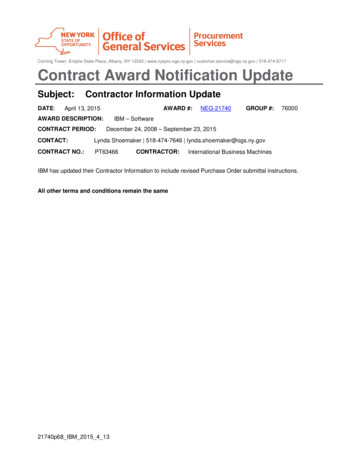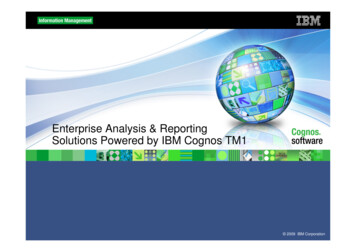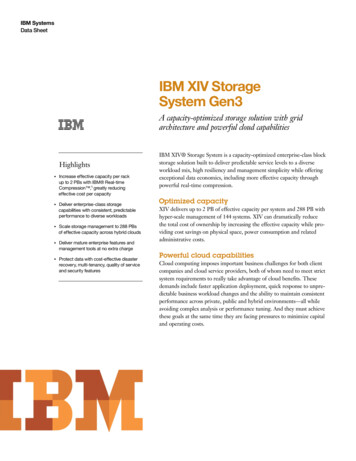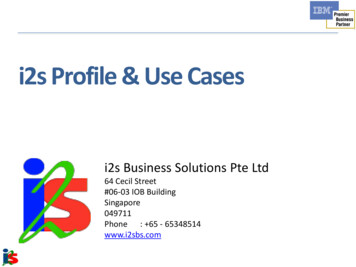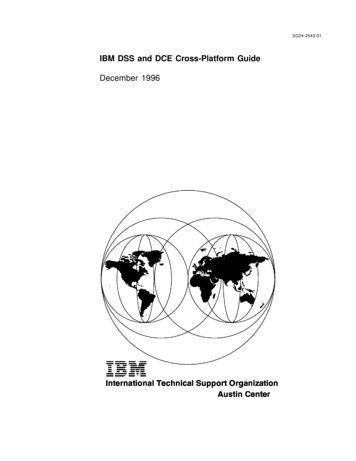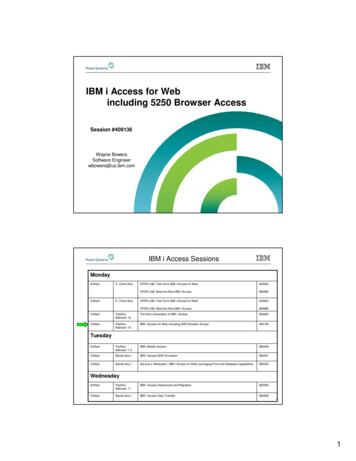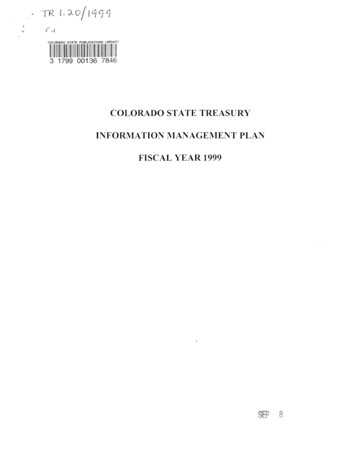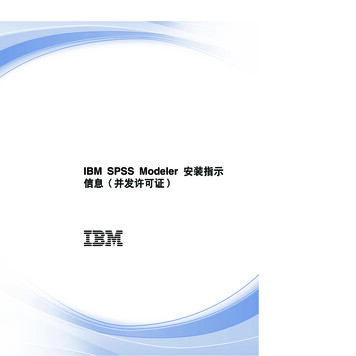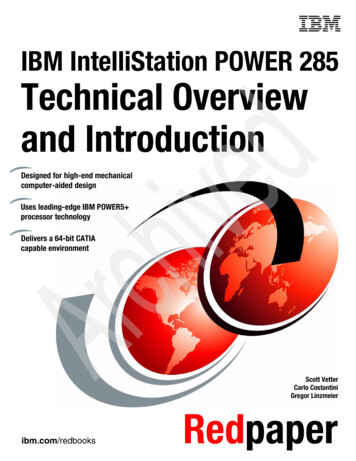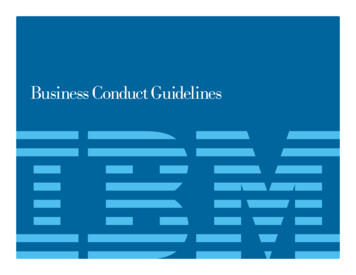
Transcription
Business Conduct Guidelines
Letter fromthe ChairmanContents –– IBM Intellectual Property–– Third Party Software–– Open Source Software1.0Guiding Principles1.1–– Trademarks–– External Standards OrganizationsCommitment to Integrity and Business Ethics1.2 Using the Business Conduct Guidelines1.3 Importance of Compliance Use of IBM Assets and Premises IBM’s Right to Access and Use Leaving IBM3.3 IBM’s Handling of Your Personal Information2.0Speaking Up3.4 Making Commitmentsand Obtaining Approvals2.13.5 Reporting, Recordingand Retaining InformationRaising Concerns and Reporting Violations2.2 Non-Retaliation Policy3.0In the Workplace3.1Work Environment3.2 IBM’s Information and Property Proprietary and Confidential Information–– Inadvertent Disclosure–– External Inquiries and Contacts Financial Controls and Reporting Retaining Records4.0In the Marketplace4.1Working with Organizations Outside of IBM IBM Business Conduct GuidelinesIntellectual PropertyWorking with Suppliers orking with Resellers andWOther Complementary Third PartiesWorking with Competitors1
4.2 Competing Fairly Statements About Competitors Selling Against Competitive Orders4.3 Acquiring and Using Information Information About Others Personal Information About Individuals 5.0On Your Own Time5.1 roprietary and Confidential InformationPOwned by OthersReceiving Gifts, Amenities and Referral Fees Giving Gifts, Amenities and Other Value4.5 Other Public Sector Matters Selling in the Public Sector Lobbying Campaign Visits on IBM Property4.6 International Trade Compliance Exports Imports Antiboycott4.7 Immigration4.8 The Environment Assisting a Competitor Competing against IBM Supplying IBM Personal Financial Interests 4.4 Gifts, Amenities and Bribes Conflicts of Interest amily and Close Relations WorkingFin the IndustryPersonal Use of IBM’s Time5.2 Inside Information and Insider Trading5.3 Public Service and Political Activity Public Service olitical Office, ContributionsPand Endorsements5.4 Speaking Publicly and Social Media6.0Further Guidance6.1 Other IBM Policies, Directivesand Guidelines6.2 Additional ResourcesIBM Business Conduct Guidelines2
Letter fromthe Chairman
Letter fromthe Chairman1.0Guiding Principles2.0Speaking Up3.0In the Workplace4.0In the MarketplaceDear IBMer,IBM’s Business Conduct Guidelines are, at the most basic level,a description of the conduct we establish for all IBMers tocomply with laws and ethical practices wherever we do business.It is a living document that we regularly review and update,as business and the world at large become more complex.But the BCGs have always been about more than complianceand ethics. By establishing these guidelines decades agoand giving them the weight of a governing document, we haveembraced the proposition that our choices and actionsdefine IBM for others. And we have sought to ensure that ourrelationships—with clients, investors, colleagues and thecommunities in which we live and work—are built on ourcore value of trust and personal responsibility.The topic of our values and their embodiment in our dailyconduct is especially relevant right now. This year, IBM willmark its 100th anniversary as a corporation. This is a notablemilestone for any business, signifying not only a legacy oftechnological and business innovation, but the even moreremarkable persistence and evolution of a distinctive culture,grounded in a powerful idea—the values-based enterprise.It is this core idea that has been embraced by millions of womenand men who call themselves “IBMers,” and who have shapedour company through decade after decade of profound change.And it was this core idea that led us to come together as aglobal workforce several years ago to reexamine and renew ourvalues for a very new world.IBM Business Conduct Guidelines5.0On Your Own Time6.0Further GuidanceFor us, they are not “IBM’s values,” but IBMers’ values. And forthe same reason, we see our Business Conduct Guidelines notas a set of rules imposed from above, but as a living manifestationof who we are and what we value—an expression of each IBMer’spersonal responsibility to manifest the highest standards of trust,ethics and responsibility in all of our actions and relationships.I am particularly pleased to introduce this refreshed edition ofthe IBM Business Conduct Guidelines. Their fundamentalprinciples remain, but the document has been revisited andimproved, to make it more readable, searchable, global andrelevant to our jobs today and tomorrow. It is written to beread, and to spark your thinking.I hardly find it necessary to remind IBMers to “act ethically.”I know you feel as strongly as I do that anyone doing otherwisedoes not belong at IBM. But as you reread and recertify youragreement to our Business Conduct Guidelines, I hope you willthink anew about what they mean. When you do, you will bestrengthening our collective understanding of what it means tobe an IBMer.Samuel J. PalmisanoChairman, President and Chief Executive Officer4
1.0Guiding PrinciplesYour daily commitment to living the IBM Valuesand following the Business Conduct Guidelinesdistinguishes IBM and IBMers. It’s no exaggerationto say that IBM’s integrity, reputation and brandare in your hands.
Letter fromthe Chairman1.0Guiding Principles2.0Speaking Up3.0In the Workplace1.1Commitmentto Integrity andBusiness Ethics1.2Using the BusinessConduct Guidelines1.3Importanceof Compliance4.0In the Marketplace1.1Integrity TipActing with integrity and according toour Values is often a question ofgood judgment, and basic questionslike these will often help you toeliminate any doubt about a decisionor proposed action:——————————Is it honest?Does it conform to the BusinessConduct Guidelines?Do I really feel comfortable withthis decision?What if this appeared in the news?What if everyone were to behavelike this?Commitment to Integrityand Business EthicsIBM’s reputation for integrity and business ethics should neverbe taken for granted. To maintain that reputation, you mustfollow these Business Conduct Guidelines and exercise goodjudgment in your decisions and actions.As IBM employees, we may face ethical and legal questions;some may be difficult ones. We should always decide thesequestions in ways that are consistent with IBM’s Values: Dedication to every client’s successInnovation that matters—for our company and for the worldTrust and personal responsibility in all relationshipsOur Values in themselves may not provide obvious answersin all cases, but they should serve as the basis for the choiceswe make. Our Values also serve as the basis for the BusinessConduct Guidelines, which provide greater guidance on thequestions you may face.1.2Using the BusinessConduct Guidelines5.0On Your Own Time6.0Further GuidanceRemember, there are no simple shortcuts or automatic answersfor the choices we have to make in business today. No singleset of guidelines or policies can provide the absolute last wordto address all circumstances. Therefore, we expect IBMersto use sound judgment in all of their conduct and ask for helpwhen needed.1.3Importance of ComplianceIf you have any questions about interpreting or applying theBusiness Conduct Guidelines—or any other IBM policies,directives, or guidelines—it is your responsibility to consultyour manager, IBM Counsel, or Trust and Compliance.A violation of any IBM guideline can result in disciplinaryaction, including dismissal.Furthermore, IBM’s policy is to comply with all laws andregulations that apply to its business. As you conduct IBM’sbusiness, you may encounter a variety of laws and legal issues,including those in the areas described below. If you havequestions on specific laws or regulations, contact IBM Counsel.Penalties for failure to comply with laws are severe and canresult in fines, lawsuits, loss of business privileges and, in somecases, imprisonment of individuals.In all instances, each of us must obey the law and act ethically.The Business Conduct Guidelines provide general guidancefor resolving a variety of legal and ethical questions for us.Employees are also expected to comply with other applicableIBM policies, directives and guidelines, some of which arereferenced here. For example, employees who work in specializedareas such as procurement, environmental, import, export,or tax, must also comply with additional functional guidelines.IBM Business Conduct Guidelines6
2.0Speaking UpYour responsibility to know and follow the BusinessConduct Guidelines includes reporting potentialviolations. IBM will promptly review your report,and will not tolerate threats or acts of retaliationagainst you.
Letter fromthe Chairman1.0Guiding Principles2.0Speaking Up3.0In the Workplace2.1Raising Concernsand ReportingViolations2.2Non-RetaliationPolicy4.0In the Marketplace2.1Raising Concernsand Reporting ViolationsIf you know of, or have good reason to suspect, an unlawful orunethical situation or believe you are a victim of prohibitedworkplace conduct, immediately report the matter through anyof IBM’s Communication Channels: 5.0On Your Own Time6.0Further Guidance2.2Non-Retaliation PolicyIBM will promptly review your report of unlawful orunethical conduct, and will not tolerate threats or acts ofretaliation against you for making that report.Your manager is usually the best place to startIBM Human ResourcesConcerns and Appeals programsIBM Internal Audit (for violations related to financialrecording and reporting, business process violations andinappropriate use of assets)IBM Security (for loss or theft of personal information orIBM assets, including proprietary or confidential information)IBM CounselIBM Trust & ComplianceIBM’s Concerns & Appeals programs include “Open Door”to higher management and “Confidentially Speaking,”which lets you raise your concern anonymously, if you sochoose. Furthermore, these programs allow you to submityour concerns online, by email, regular mail, fax or phone.IBM Business Conduct Guidelines8
3.0In the WorkplaceAs part of IBM’s Globally Integrated Enterprise,your workplace may include working from an IBMlocation, a client location, or your home. Whereveryou are, you will interact with other IBMers,and come in contact with sensitive information,intellectual property, and other valuable assets.Whether communicating in person, over the phone,online, or by any other means or media, theBusiness Conduct Guidelines apply.
Letter fromthe Chairman1.0Guiding Principles2.0Speaking Up3.0In the Workplace4.0In the Marketplace5.0On Your Own Time6.0Further Guidance3.1Work Environment3.2IBM’s Informationand Property3.3IBM’s Handlingof Your PersonalInformation3.4MakingCommitments andObtaining Approvals3.1Work EnvironmentIntegrity TipIf you believe you have beensubjected to prohibited workplaceconduct, immediately report thematter through any of the designatedIBM Communications Channels,including IBM’s Concerns andAppeals programs. Your report of suchconduct will be reviewed promptly.IBM strives to maintain a healthy, safe and productive workenvironment which is free from discrimination and harassment,whether based on race, color, religion, gender, gender identityor expression, sexual orientation, national origin, genetics,disability, age, or any other factors that are unrelated to IBM’slegitimate business interests. IBM will not tolerate sexualadvances, actions or comments, racial or religious slurs or jokes,or any other comments or conduct that, in the judgment ofIBM management, creates, encourages or permits an offensiveor intimidating work environment.Other prohibited conduct, because of its adverse impact on thework environment, includes: Threats or violent behaviorPossession of weapons of any typeUse of recording devices, including cell phone camerasand web cameras, except as authorized by management andIBM CounselA manager having a romantic relationship with a subordinateUse, distribution, sale or possession of illegal drugs or any othercontrolled substance, except for approved medical purposesBeing under the influence of illegal drugs, controlledsubstances used for non-medical purposes, or alcoholicbeverages in the workplace—— Consumption of alcoholic beverages on IBM premisesis only permitted, with prior management approval, forcompany-sponsored eventsFurthermore, if IBM management finds that your conduct onor off the job adversely affects your performance, that of otheremployees, or IBM’s legitimate business interests, you will besubject to disciplinary action, including dismissal.IBM Business Conduct Guidelines3.5Reporting, Recordingand RetainingInformation3.2IBM’s Informationand PropertyIBM has extensive assets of great value. These assets includevaluable proprietary information, such as IBM’s intellectualproperty and confidential information, as well as physicalproperty and systems. Protecting all of our assets is critical.Their loss, theft, misuse or unauthorized disclosure canjeopardize IBM’s future.You are personally responsible for protecting IBM’s assets ingeneral, as well as those entrusted to you. This includes thoseassets that you have been authorized to provide to other IBMemployees, contract personnel, clients or others. To do this, youshould know and understand IBM’s security controls, processesand practices. You should be alert to situations that could leadto the loss, misuse, theft, or unauthorized disclosure of ourassets. Furthermore, you should report those situations to IBMSecurity or your manager as soon as they come to your attention.Proprietary andConfidential InformationAs an IBM employee, you will have access to information thatIBM considers proprietary. Most IBM proprietary information isconfidential, and often subject to copyright, patent or otherintellectual property or legal rights. It is also the result of thehard work and innovation of many IBMers and investments madeby IBM. IBM’s competitive advantage from this informationwould be lost if such information was improperly disclosed, evenif the disclosure is inadvertent. To help maintain the value ofthis important information, it is critical that you follow all IBMsafeguards for protecting that information and that you onlydisclose or distribute that information as authorized by IBM.10
Letter fromthe Chairman1.0Guiding Principles2.0Speaking Up3.0In the Workplace4.0In the Marketplace5.0On Your Own Time6.0Further Guidance3.1Work Environment3.2IBM’s Informationand Property3.3IBM’s Handlingof Your PersonalInformation3.4MakingCommitments andObtaining ApprovalsIBM proprietary information is any information that IBMowns, including for example: Information about current and future products,services or researchBusiness plans or projectionsEarnings and other financial dataPersonnel information including executive andorganizational changesSoftware in object or source code formInadvertent DisclosureYou should be careful to avoid inadvertent disclosure. Neverdiscuss proprietary information that IBM considers confidentialor which IBM has not made public with, or in earshot of, anyunauthorized person. Activities where inadvertent disclosurecould occur include a conversation (in person or by telephone)in any public area, in a blog or within a social network. Also,you should not discuss such information with family membersor friends. They might innocently or otherwise pass theinformation on to someone else.3.5Reporting, Recordingand RetainingInformationIntellectual PropertyIBM Intellectual PropertyAs an IBM employee you will have access to and may developIBM intellectual property. When you joined IBM, yousigned an employee agreement in which you assumed specificobligations relating to intellectual property. For example, youassign to IBM all of your rights in certain intellectual propertyyou develop. That intellectual property includes such thingsas ideas, inventions, software, templates, publications and othermaterials relating to IBM’s current or anticipated offerings,business, research or development. Subject to the laws of eachcountry, this applies no matter where or when—at work orafter hours—you create such intellectual property. You mustdisclose that intellectual property to IBM and protect it likeany other IBM proprietary information. Information on howto report and protect intellectual property can be found at theIntellectual Property & Licensing site. In addition, you shouldalso seek advice and direction from your IBM IntellectualProperty Counsel before you file for a patent other than throughIBM, and provide IBM with copies of any patents you haveapplied for or obtained.External Inquiries and ContactsIBM’s business activities are monitored by journalists, consultants,securities analysts and others. You should not contact theseindividuals or groups or respond to their inquiries, whetheronline (including social media), telephonically, or otherwise,without authorization as follows: IBM Business Conduct GuidelinesJournalists—IBM CommunicationsConsultants or IT Analysts—IBM Analyst RelationsSecurities or Financial Analysts—IBM Investor RelationsAttorneys or law enforcement officials—IBM CounselEnvironmental groups—Corporate Environmental AffairsThird Party SoftwareYou should exercise caution in obtaining third party softwarefrom others, including commercial and open source software.Software includes computer programs, databases and relateddocumentation, and can be in any stage of development.Software may be on tangible media (e.g. CDs, portable devicesand publications), or it may be downloadable or accessible foruse online. The license for the software sets out the rights andobligations that must be complied with, such as how and wherethe software may be used, whether it may be modified or11
Letter fromthe Chairman1.0Guiding PrinciplesIntegrity TipDid you know that even if software isfree it may be unacceptable for use onIBM systems or in our offerings? Thatis because the license may not permitsuch use or, possibly, no license wasprovided (which may prevent any useof the software in some countries).There is also the risk that the softwarecontains harmful code, such asviruses or Trojan horses, which canbe costly to IBM.2.0Speaking Up3.0In the Workplace4.0In the Marketplace5.0On Your Own Time6.0Further Guidance3.1Work Environment3.2IBM’s Informationand Property3.3IBM’s Handlingof Your PersonalInformation3.4MakingCommitments andObtaining Approvalsdistributed and, possibly, what rights IBM is obligated to grantto others. The terms and conditions of the license agreementmust be strictly followed. You must follow applicable businessunit and CIO Office procedures before you load softwarefrom any source onto any computer or device provided by IBMor used primarily for IBM business purposes. You must alsofollow those procedures before you distribute, access or receivesoftware from inside or outside of IBM, or otherwise accept alicense agreement.External Standards OrganizationsOpen Source SoftwareUse of IBM Assets and PremisesDo not confuse open source software with software that is inthe public domain. Open source software licenses oftenimpose obligations that could result in a conflict of interestwith IBM and the inappropriate transfer of IBM’s intellectualproperty rights. If you want to be involved with or use opensource software you must first obtain management approvaland comply with IBM’s Open Source Participation Guidelines.TrademarksIBM and many other companies have trademarks—words,names, symbols or designs—that are used to identify anddistinguish the company and its products. It is important thatyou properly use IBM’s and other companies’ trademarks.For guidance on proper usage and acknowledgement of IBM’sand certain third party trademarks, refer to IBM’s Copyrightand Trademark Information. In addition, you should notuse a word, name, symbol or design as a trademark withoutfirst going through the Naming Approval Process.IBM Business Conduct Guidelines3.5Reporting, Recordingand RetainingInformationBefore you participate in any external standards activity, youmust get approval from management, with guidance fromIntellectual Property and Standards. In addition to theobligations that you and IBM may have to the standardsorganization, you also need to understand your responsibilitiesto protect IBM’s intellectual property; to submit to IBM anyintellectual property you create; to avoid conflicts of interest;and to comply with antitrust and other laws.Protection of IBM’s assets, workplace environment and businessinterests, including compliance with legal requirements, arecritical to IBM’s operations and marketplace integrity. All IBMassets—proprietary information, such as IBM’s intellectualproperty and confidential information, as well as physicalproperty and systems—should only be used to conduct IBM’sbusiness or for purposes authorized by IBM management. Thisobligation applies whether or not you developed the informationyourself, and it applies by law in virtually all countries whereIBM does business. IBM’s physical property and systems includeequipment, facilities, information and communication systems,corporate charge cards and supplies. IBM’s property andsystems, including IBM connections to the Internet, should alsoonly be used for appropriate purposes. Incidental personaluse of such property and systems—meaning use that is limitedin duration, does not violate company policies, and does notinterfere with doing your job—may be permitted by management.However, it is never permissible to use IBM’s systems forvisiting Internet sites that feature sexual content or gambling,that advocate intolerance of others, or that are inconsistentwith IBM’s Values and business interests. It is also inappropriateto use them in a manner that interferes with your productivityor the productivity of others.12
Letter fromthe Chairman1.0Guiding Principles2.0Speaking Up3.0In the Workplace4.0In the Marketplace5.0On Your Own Time6.0Further Guidance3.1Work Environment3.2IBM’s Informationand Property3.3IBM’s Handlingof Your PersonalInformation3.4MakingCommitments andObtaining ApprovalsIBM’s Right to Access and UseLeaving IBMYou should understand IBM has the right to inspect your use ofIBM assets, including your communications using IBM’s assets.You should understand that IBM does not consider any such usesof its assets to be private. Therefore, you should not place or keepany personal items, messages or information that you considerprivate anywhere in the IBM workplace, such as, telephone,office, or email systems, electronic files, laptops, smartphonesand other personal communication devices, lockers, desks, oroffices. If you choose to do so, you should understand that IBMmay at any time, monitor, recover through technical or othermeans, and review employee communications including emailsfrom personal email accounts, records, files, and other itemsIBM finds through or in its systems, assets and any other IBMareas or IBM provided facilities, for any purpose. In addition,in order to protect its employees, assets, and business interests,IBM may share outside of IBM anything it finds, such as withits outside legal or other advisors, or with law enforcement.If you leave IBM for any reason, including retirement, youmust return all IBM assets, such as documents and mediawhich contain IBM proprietary information, and you may notdisclose or use that information. Also, IBM’s ownership ofintellectual property which you created as an IBM employeecontinues after you leave IBM. Regrettably, there have beencases in which IBM’s proprietary information or other assetshave been wrongfully taken or misused. IBM has and willcontinue to take every step necessary, including legal measures,to protect its assets.Additionally, in order to protect its employees, assets andbusiness interests, IBM may ask to search an employee’s personalproperty, including briefcases and bags, located on or beingremoved from IBM locations. If you use personal electronicdevices for IBM-related work, then those devices may also beexamined by IBM. You are expected to cooperate with allsuch requests. Employees, however, should not access anotheremployee’s work space, including email and electronic files,without prior approval from management. For additionalinformation on access to company property and employeepersonal property, refer to Access to Property & Information.IBM Business Conduct Guidelines3.5Reporting, Recordingand RetainingInformation3.3IBM’s Handling of YourPersonal InformationTo the extent permitted by law, IBM and IBM authorizedcompanies and individuals collect and maintain personalinformation which relates to your employment, such ascom pen sation, medical and benefit information. As a globallyintegrated enterprise, IBM’s business processes, managementstructures and technical systems cross country borders.Therefore, you acknowledge that, to run its business, IBM andits authorized companies may transfer personal informationabout you as an IBM employee to any of the countries wherewe do business. While not all countries have data protectionlaws, IBM has worldwide policies that are intended to protectinformation wherever it is stored or processed.13
Letter fromthe Chairman1.0Guiding Principles2.0Speaking Up3.0In the Workplace4.0In the Marketplace5.0On Your Own Time6.0Further Guidance3.1Work Environment3.2IBM’s Informationand Property3.3IBM’s Handlingof Your PersonalInformation3.4MakingCommitments andObtaining ApprovalsFor example: IBM handles your personal information in accordance withits corporate policies and practices, including CorporatePolicy 130, Corporate Instruction HR 113 and theIBM Guidelines for the Protection of Employee InformationAccess to your personal information is restricted to peoplewith a need to knowPersonal information is normally released to outside partiesonly with employee approval, except that IBM and authorizedcompanies and individuals may also release personalinformation to verify employment, to satisfy the legitimaterequirements of a company or other entity which isconsidering acquiring some of IBM’s business operations,or for appropriate investigatory, business or legal reasonsLikewise, in your work you may have access to personalinformation of others. You must ensure that you use and disclosethat information only as permitted by IBM policies or practices.3.4Making Commitmentsand Obtaining ApprovalsIBM’s approval processes are designed to help IBM protect itsassets and maintain appropriate controls to run its businesseffectively, whether you are dealing with clients, IBM BusinessPartners, suppliers, or other third parties. Within theseprocesses, authority for pricing, contract terms and conditionsand other actions may have been delegated to certain functionsand to line management. Making business commitments outsideof IBM’s processes, delegation limits or without appropriateapprovals, through side deals or otherwise, is not acceptable.IBM Business Conduct Guidelines3.5Reporting, Recordingand RetainingInformationModifications of pricing, contract or service terms, must beapproved by the appropriate level of management or authorizedfunction. Do not make any oral or written commitmentsthat create a new agreement or that modify an existing IBMagreement with a third party without approval, consistentwith delegation levels. All commitments must be reported toIBM Accounting to help ensure the accuracy of IBM’s booksand records.3.5Reporting, Recordingand Retaining InformationEvery employee records or reports information of some kindand submits it to the company and others with whom weinteract. In doing so, you must ensure that all information isrecorded and reported accurately, completely and honestly.Never make misrepresentations or dishonest statements to anyone.If you believe that someone may have misunderstood you,promptly correct the misunderstanding. Reporting inaccurateor incomplete information, or reporting information in a waythat is intended to mislead or misinform those who receiveit, is strictly prohibited and could lead to serious consequences.The following are some examples of dishonest reporting: Submitting an expense account for reimbursement ofbusiness expenses not actually incurred, or misrepresentingthe nature of expenses claimedFailing to properly record time worked on a billable clientproject, whether or not such time is charged to the client14
Letter fromthe Chairman1.0Guiding Principles2.0Speaking Up Integrity TipUnder various laws, such as tax andsecurities laws, IBM is required tomaintain accurate books. Violations oflaws associated with accounting andfinancial reporting can result in fines,penalties and imprisonment, as wellas a loss of public faith in a company.If you become aware of any actionrelated to accounting or financialreporting that you believe may beimproper, you should immediately tellIBM, by informing IBM Accounting,Internal Audit, your management,IBM Counsel, or by using any of IBM’sother Communications Channels. 3.0In the Workplace4.0In the Marketplace5.0On Your Own Time6.0Further Guidance3.1Work Environment3.2IBM’s Informationand Property3.3IBM’s Handlingof Your PersonalInformation3.4MakingCommitments andObtaining ApprovalsFor those eligible for overtime, failing to record all hoursworked including all overtime hours, which must bemanagement approved in line with IBM guidelinesProviding inaccurate or incomplete information to IBMmanagement, IBM Internal Audit or IBM Counselduring an internal investigation, audit or other review,or to organiza tions and people outside the company, such asexternal auditorsMaking false or misleading statements in external financialreports, environmental reports, import/export documentation,or other documents submitted to or maintained forgovernment agenciesIn order for IBM to conduct investigations and reviews, itneeds the help and cooperation of IBM employees. You arerequired to fully cooperate with all authorized internalinvestigations and reviews, and to promptly, completel
your concerns online, by email, regular mail, fax or phone. 2.2 . Non-Retaliation Policy . IBM will promptly review your report of unlawful or . unethical conduct, and will not tolerate threats or acts of retaliation against you for making that report. 2.2 Non-Retaliation Policy 2.1 Raising Concerns and Reporting Violations
